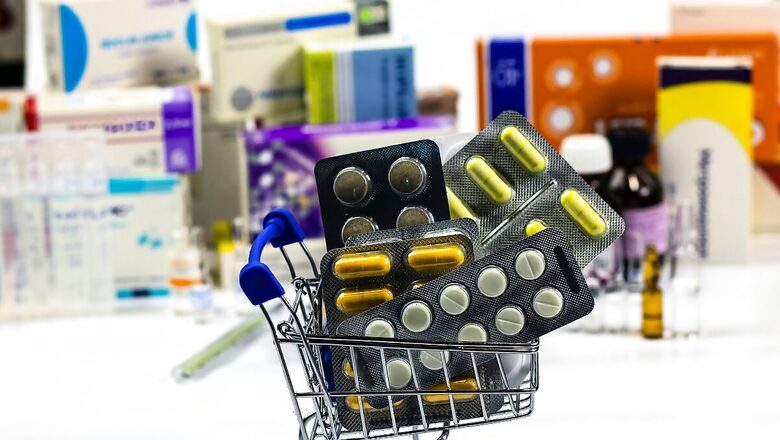
views
Antacid Pan D, calcium supplement Shelcal, anti-diabetic drug Glimepiride, high blood pressure drug Telmisartan and many more top-selling medicines have been flagged for failing quality tests in the latest monthly drug alert issued by the country’s drug regulatory agency.
According to the “Not of Standard Quality (NSQ) alert” for August, released by the country’s drug regulation watchdog Central Drugs Standards Control Organisation (CDSCO), more than 50 drugs have been declared NSQ or substandard. NSQ alerts are results of random sampling done by state drug officers on a monthly basis.
The list holds importance due to the failure of critical, essential medicines manufactured by several top pharma firms, including Hetero Drugs, Alkem Laboratories, Hindustan Antibiotics Limited (HAL) and Karnataka Antibiotics & Pharmaceuticals Ltd. The companies, however, have indicated that the flagged batches are spurious and not manufactured by them.
Popular drugs failing quality tests
Multiple batches of the well-known hypertension drug Telmisartan have failed quality tests. These drugs were manufactured by Haridwar-based drugmaker Life Max Cancer Laboratories.
A popular drug to treat stomach infections, Metronidazole, manufactured by PSU Hindustan Antibiotic Limited (HAL), is part of the drugs failing tests. Similarly, Shelcal, sold by Torrent Pharmaceuticals and manufactured by Uttarakhand-based Pure & Cure Healthcare, failed the test.
Pharma firm Alkem Health Science’s antibiotic drug Clavam 625 and Pan D have been found spurious by a drug-testing laboratory in Kolkata. The same lab found Hyderabad-based Hetero’s Cepodem XP 50 Dry Suspension of spurious quality. The drug is prescribed to children to treat severe bacterial infections of the throat, lungs, urinary tract or more. Karnataka Antibiotics & Pharmaceuticals Ltd’s paracetamol tablets have also been flagged.
‘Drugs spurious, not manufactured by us’: Top drug makers to govt
The second part of the NSQ alert list released by the drug regulator lists five drugs manufactured by the country’s top drug makers, including three drugs by Sun Pharmaceuticals, one by Glenmark and the other one by Macleods Pharma. This month, CDSCO has posted two different lists — one with products of big pharma companies and their replies and the other a regular list.
Drugs manufactured by Sun Pharma include acid reflux drug Pantocid, erectile dysfunction drug Pulmosil and gallstone dissolving drug Ursocol 300. Other medicines are Glenmark’s Telma H, a popular hypertension drug, and Macleods Pharma’s arthiritis drug Defcort 6.
However, speaking to News18, a spokesperson for Alkem said the company “gives utmost importance to quality”. “The products mentioned seem to be spurious and not manufactured by Alkem. The company is engaging with the authorities on this matter.”
A Sun Pharma spokesperson raised the same issue. “We have investigated the matter and found that Pulmosil (Sildenafil Injection), batch no KFA0300; Pantocid (Pantoprazole Tablets IP), batch no SID2041A, and Ursocol 300 (Ursodeoxycholic Acid Tablets IP), batch no GTE1350A are spurious. The said batches tested by the regulatory authority are not manufactured by Sun Pharma.”
The responses indicate that the companies have denied any responsibility for the manufacture of these drugs, maintaining that they are “spurious”.
“The actual manufacturer (as per label claim) has informed that the impugned batch of the product has not been manufactured by them and that it is a spurious drug. The product is purported to be spurious, however, the same is subjected to outcome of investigation,” said the alert in the column stating the response of the drug makers.
The list released in July had also flagged popular brands. The trend is concerning and is viewed as a significant risk by health experts for both doctors and patients alike.
According to Dr Sumit Ray, medical director at Holy Family Hospital, “it is not good news for doctors, patients, and the country as a whole”.
“Patients do not recover in time and thus have to be given longer therapies or added doses of medications to manage their illnesses. Along with that, the increased cost of medications and repeated visits to doctors due to inadequate response is a financial burden.”
Also, poor-quality antibiotics lead to a further increase in Antimicrobial Resistance (AMR), which is already a huge burden in India.
Apart from hurting at the domestic level, the trend will further tarnish the reputation of India in the global arena. Since October 2022, India has faced several allegations of exporting low-quality, contaminated medicines to The Gambia, Uzbekistan, the United States, the Marshall Islands, Micronesia, and Sri Lanka. These accusations cast a negative light on India’s drug regulatory agency CDSCO, significantly impacting the reputation of India as the global pharmaceutical hub.




















Comments
0 comment